100 days as Head of Chemical Engineering: interview with Professor Nilay Shah
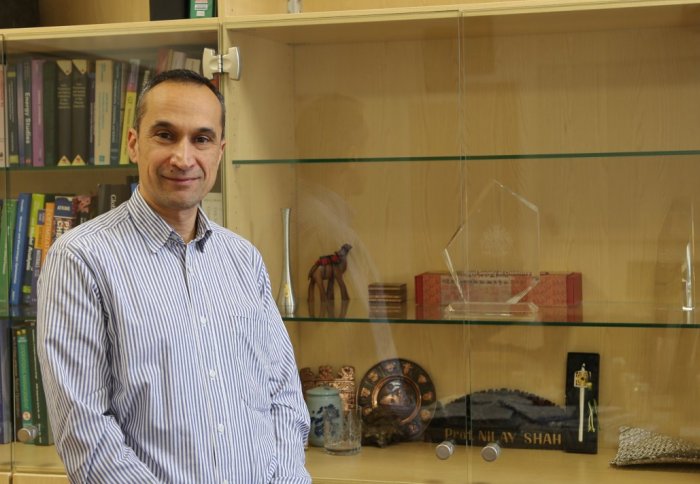
Interview with Professor Nilay Shah who was appointed Head of the Department of Chemical Engineering at Imperial on 1 October 2016.
On 1 October 2016 Professor Nilay Shah was appointed Head of the Department of Chemical Engineering, succeeding Professor Andrew Livingston who had led the Department since 2008. Professor Shah first joined Imperial as an undergraduate student in Chemical Engineering. He obtained his PhD in Chemical Engineering from Imperial in 1992 (co-supervised by Professor Costas Pantelides and Professor Roger Sargent), progressing from Lecturer to Senior Lecturer at the College before his appointment as Professor in 2001. His awards include a Shell Lecturer Support Award (1992-1996), Imperial College London Teaching Excellence Award (1995), Institution of Chemical Engineers Junior Moulton Medal (1996), ICT/Royal Academy of Engineering Fellowship (1997-2002), the Royal Society of Chemistry Beilby Medal and Prize (2005) and the Royal Academy of Engineering MacRobert Award and Prize (2007). Most recently he was Director of the Centre for Process Systems Engineering (2009-2016) and was appointed a Fellow of the Royal Academy of Engineering in 2015. 100 days into his new job, we asked him to reflect on how he got here, his experience of the job and what his aspirations are for the Department.
1. What inspired you to study Chemical Engineering?
I have to think back a long time because I was probably seventeen when I decided I wanted to do chemical engineering. I have always wanted to be an engineer and I have always liked science as well. I wanted to study an engineering discipline that had more scientific content than pure engineering. If you think of the more pure engineering disciplines you would probably go for civil, aeronautical or mechanical engineering. I also enjoyed chemistry but I was more interested in using science to do things rather than the discovery elements of science. When I was thinking this through it seemed that chemical engineering had the right balance of strong scientific content with real application to do things, make things, be helpful to society and so on. It turned out to be a good decision I think! But I have to say I didn’t spend hours and hours and hours debating it, it was a fairly quick decision as it typically is at that age.
It turned out to be a good decision I think!
– Professor Nilay Shah
2. Why did you decide to study at Imperial?
Once I made the decision to study chemical engineering and to study in the UK, I set about looking for the best place to do chemical engineering. The interesting thing about Imperial is that you really start chemical engineering pretty much in your second week of coming here. We kick off with chemical engineering and it’s all purpose-designed and that’s what I really liked about it. It wasn’t a bit of engineering science and tack on some chemical engineering later. Chemical engineering from day one, purpose-designed programme and of course really excellent programme as well. So that’s why I chose Imperial.
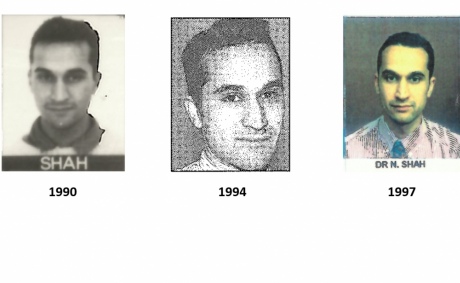
Professor Nilay Shah in his early years at Imperial
3. Do you enjoy being an academic?
I think the beauty of being an academic is that you are given courses to teach and you aim to do world-class research, but beyond that it’s up to you how you do it: the way you structure your work, your day, the way in which you teach and to a certain degree, what you teach, is up to you. When you’re teaching a course you are given a broad set of learning outcomes and as long as you deliver those learning outcomes, it’s up to you, so you can do it in a way that suits you and in a way that best suits the students.
Teaching takes up 30-40% of your time. The rest of the time is a combination of management, administration and research. It’s entirely up to you what topic you want to research. From one day to the next, you can decide “I want to become an expert in water” and go and learn about water and see what the chemical engineering challenges are in water, or energy, or food or health or whatever you like. That’s the nice thing about chemical engineering: it’s relevant to so many different things, as long as you can find an angle to work on, you can pursue your interests. On the management, administration and leadership side, again there are all kinds of things the department needs to be able to do, so you can find something that suits you, discuss it with your line manager, and get on with it. We have a lot of flexibility.Being an academic brings some challenges: because the life is very unstructured you have to have discipline to structure your life well, to organise your work well and make sure that you are productive. Spending time doing the right things and not spending time in an unproductive way. Whereas if you’re in a big organisation with a very defined role, your next 6 months might be quite well mapped out, you know you’re working on project X with client Y but we don’t really have that kind of structure. So you have to develop that structure for yourself.
I always spend about 10-15 minutes *not* rushing into things and thinking about what I want to achieve today
– Professor Nilay Shah
4. How does your average working day look like?
I wish there was an average working day! Let’s take a term-time day. I would get in at about 8:15 and then I always spend about 10-15 minutes not rushing into things and thinking about what I want to achieve today. I have a cup of coffee, look at my very long to-do list and think about which of those things I am going to try to tackle today; I spend time just planning, based on priorities and other things. I read a very interesting thing, I think the former first lady Eleanor Roosevelt said it, which was “Every day you should do one thing that you are really not looking forward to” because otherwise we let those things pile up. So I try to put in to my to-do list of the day something I’m not particularly looking forward to and get it done, because you do feel a lot better. After that I’ll catch up with emails, then I will prepare for and deliver my lecture. The rest of the day will be a mix of things such as things to do with running the department, – depending on the time of the year – might be looking at finances or the strategy or things we want to change which might be to do with student numbers or our broad research areas or research volume. I will spend some time with my research team to get a bit of an update from my students or postdocs and make sure they’re getting what they need from me. I spend time with some of the administration team in the department to keep up to date with some of our priorities because we’ve always got things that are on-the-go. Then there are things that I have to do occasionally, such as setting exams, which I just did recently, and now I will be doing some marking, but often marking I tend to take home and work on that at home. A typical day probably has more meetings than I would like and less time for me to think, but that’s the nature of the job.
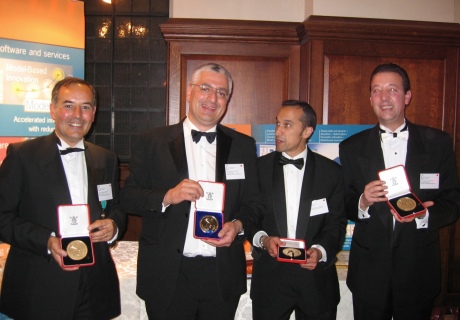
Receiving the MacRobert Award alongside other co-founders of the spinout Process Systems Enterprise.
5. How was your first day as Head of Department?
On my first day I spent some time thinking about what I want to achieve in my five years, what I want to prioritize, and what sorts of things I want to do in terms of departmental culture. I spent some time looking back at our strategy review: we recently spent about 2 years on a comprehensive review of the departmental strategy and setting a new strategy, so I spent quite a bit of time looking at that, and thinking about what it means for me. Andrew’s (Andrew Livingston, previous Head of Department) role was to get us up and running to think about what this set of objectives should be for the next 10 years. My role is delivering that: there is no point trying to say “let’s tear that up and rethink the strategy”, I think everyone would be quite frustrated if I did that… It’s really about how we are going to deliver that strategy.
The pleasant surprise is what an amazing team of people I have at every level in the department
– Professor Nilay Shah
I spent quite a bit of time setting my priorities and what I want to do and what kind of things I can realistically achieve. I did actually think about the first 100 days and some of the things that I wanted to do in that first 100 days. Some of the important things were around safety. The job of the Head of Department is about making sure we are a high-achieving department, that we achieve our targets and our aspirations, but actually my most important job is to make sure everybody is safe in the Department and not exposed to unnecessary harm. I spent quite a bit of time thinking about safety and where I think the big issues are in safety and we came up with some issues and concerns around things such as late and lone working.
I also met with the Dean of the Faculty (Professor Jeff Magee), who is my boss, and we spoke about my priorities and how they fit with his priorities. I spent the next few days talking with some of the senior members of my executive team, who look after different elements of the Department: teaching, finance and resources, research and administration, and how we are going to work as a team, do they agree with my priorities, what are their priorities and how do we set a plan.
There is a temptation to rush into the job and just do a lot of firefighting and not step back and say “where do we want to go?”. I think that’s going to be a challenge, because what I have noticed is that there is a huge volume of stuff to do and you can get so bogged down that you don’t get a chance to step back and say “are we going in the right direction?”.
6. What has been the biggest surprise so far about being the Head of Department?
I would say the volume of stuff that comes through that you have got to deal with, which isn’t necessarily very intellectually demanding but you have to address it and often you have to be quite decisive about it as well, so you can’t dilly-dally with it. There is a lot of stuff to do and you suddenly realise all the things that go on in the department. You usually only see bits and pieces of what goes on but once you’re the Head you really see the totality of it. But! The pleasant surprise is what an amazing team of people I have at every level in the department, from the senior to the junior. I now have a much better appreciation of who does what, how amazing everyone is at their jobs and how they’re all very keen to do their daily work which is what makes this collectively a good department to work in, so that was a very pleasant surprise.
7. How do you spend your free time?
It’s mainly family time, I like to read, follow football, we like going out for long walks in the countryside. We just got a new kitten, so that’s taken up quite a bit of the little free time I have, playing with the kitten, kitten care…
8. How do you see the future of the Department?
We really do have the best students and the best staff from around the world
– Professor Nilay Shah
It’s exciting because we’ve got really good people working here. The department is a building and we have some nice equipment in it. But 90% of the assets of the department are all the people here, the staff and the students. We really do have the best students and the best staff from around the world, so we are in a good position.
I do worry a bit about the UK political environment, because I think the UK is sending out signals around the world that we are not as welcoming as we used to be, and I worry that it will have an impact on the department. And it will not be a positive impact, but I am hoping that we can do our best to mitigate it. I also feel that all the universities in the UK will be somewhat affected, but I think we will be much less affected than most of the others. So I’d say a challenge for us is to present Imperial and London as a very welcoming place for everyone. I also think there are things that we can do much better in terms of productivity and procedures, and the educational programme on the student side, and although we have started from a very good base, things can be even better.
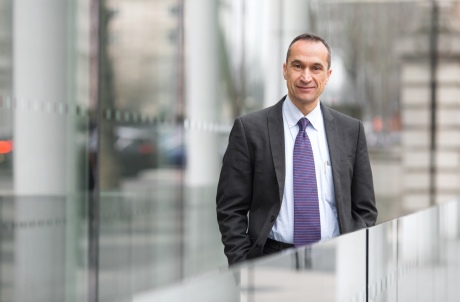
9. What advice would you give to a student or someone starting out their career?
The modern world is a place where intelligent people can go a long way if they are also willing to be flexible, open-minded and pragmatic at times
– Professor Nilay Shah
One thing I definitely say to people is always be open-minded about life and the opportunities that it brings, and be flexible. The modern world is a place where intelligent people can go a long way if they are also willing to be flexible, open-minded and pragmatic at times. Be sensible in how you balance your work and the other things you do. Some people may overdo it on the work side and then eventually when they graduate we get the feedback they enjoyed the course, but they didn’t have as good a time being a young person and a student in London as they should have. Equally we sometimes get students who end up struggling a bit because they haven’t given the course the attention it needed, and they were getting the balance wrong in the other way. When you think about the future, you really have to be open-minded and flexible about what you are going to do and where you are going to do it. Don’t set your heart on working for a specific company in a specific part of the world, because that narrows your options and might lead to disappointment.
10. How would you describe your first 100 days?
Fun! Very busy, more rewarding than I thought and quite eye-opening as well, about the opportunities and the challenges.
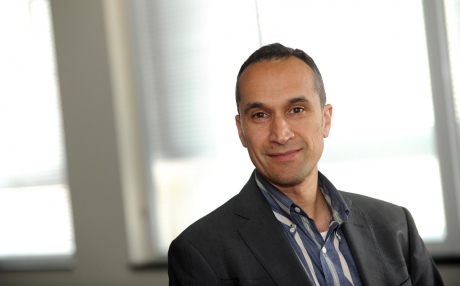
[Interview conducted by Dora Olah an Undergraduate student in the Department of Chemical Engineering.]
Article text (excluding photos or graphics) © Imperial College London.
Photos and graphics subject to third party copyright used with permission or © Imperial College London.
Reporter
Michael Panagopulos
Department of Chemical Engineering